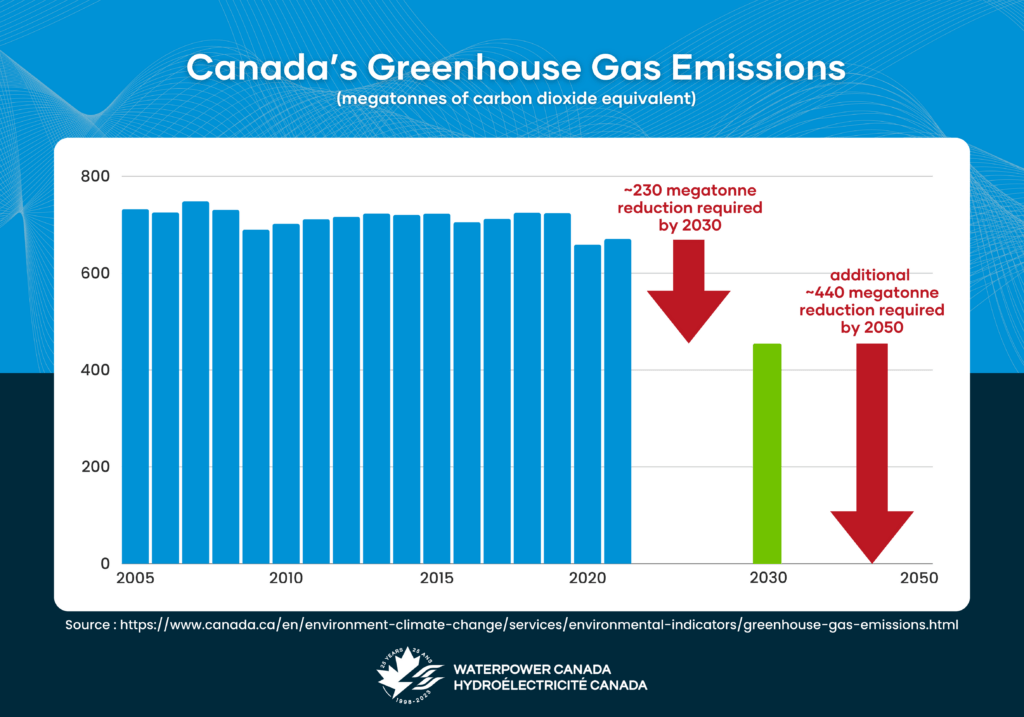This piece was featured in The Hill Times on Monday, November 20, 2023
Canada has established aggressive GHG reduction targets – economy-wide reductions of 40 per cent from 2005 levels by 2030 and a net-zero electricity sector by 2035. With six years to go, Canada will need to reduce emissions by 35 per cent, or 230 megatonnes, to achieve its 2030 target. A further 440 megatonnes are needed to reach its 2050 net-zero goal.

In 2021, GHG emissions from the electricity sector were 56 percent lower than in 2005. Other sectors have not come close to this achievement; emissions from the oil and gas, agriculture, and
building sectors have increased over this period.
Achieving our goals will require unprecedented, concerted, and sustained efforts to use non-emitting electricity for vehicles, space heating, appliances, and industrial processes. Our message to policy makers is to take action to make it happen. Reductions will not happen until the use of fossil fuel equipment (vehicles, appliances, heating and industrial systems) declines. While the electrification process will take time, the need to begin is urgent and concrete policy actions are required now.
Waterpower Canada endorses ending new baseload gas-fired generation after 2035, as proposed by the draft Clean Electricity Regulation. Supplying more of our energy needs through electricity will require significantly more low emitting supplies. While much of the energy can come from variable renewables like wind and solar power, we will require large additions of firm resources that are available on demand. These firm power sources can be counted on to ensure grid reliability when variable renewables are not available.
Hydropower is an ideal solution because it is both firm and renewable, and Canada has tens of thousands of megawatts of hydropower potential.
WaterPower Canada members are prepared to reinvest in their existing assets and pursue new hydropower and pumped storage facilities to meet a growing demand for reliable generating capacity. Unfortunately, federal policies intended to help incent these investments require modifications while other federal policies and regulations actually discourage investment. We call on our federal government to align its policies across the whole of government to allow rapid growth of clean electricity generation and transmission in concert with its overarching goal to reduce GHG emissions.
Budget 2023 announced the Clean Electricity and Clean Technology Investment Tax Credits. As currently proposed, the ITC programs are overly complex, overlap with other federal initiatives, and are not consistent with the stated objective of encouraging expedited investments.
Budget 2023 also announced a commitment by our federal government to streamline regulatory and permitting processes. This initiative is long overdue. WaterPower Canada members are committed to rigorous environmental assessment and permitting processes, but processes under the Fisheries Act, the Migratory Birds Regulations and the Impact Assessment Act, waste precious time and do not provide certainty to project proponents. Submissions for routine and small footprint activities are often met with demands for ‘more study’ and ‘more detail’ instead of specific guidance and approval.
If nothing changes, our GHG reduction targets will not be met. To achieve meaningful progress, concrete actions are urgently required:
- Federal and Provincial governments need to develop clear plans and strategies to drive the electrification of the economy including incentives, codes, and standards for end use equipment.
- Constraints and duplication in programs, such as the Clean Electricity Tax Credit, need to be eliminated so they are effective drivers for expedited investment in clean electricity projects.
- Environmental assessment and permitting processes and policies need to be streamlined and explicitly recognize the overarching importance of renewable energy projects. The objective should be to reduce the average time for project approval in half within 18 months.
WaterPower Canada and its members are committed to working with governments, indigenous groups, and communities to move Canada towards net-zero. We are ready to support a renewable future.
But we need to get started … today!
